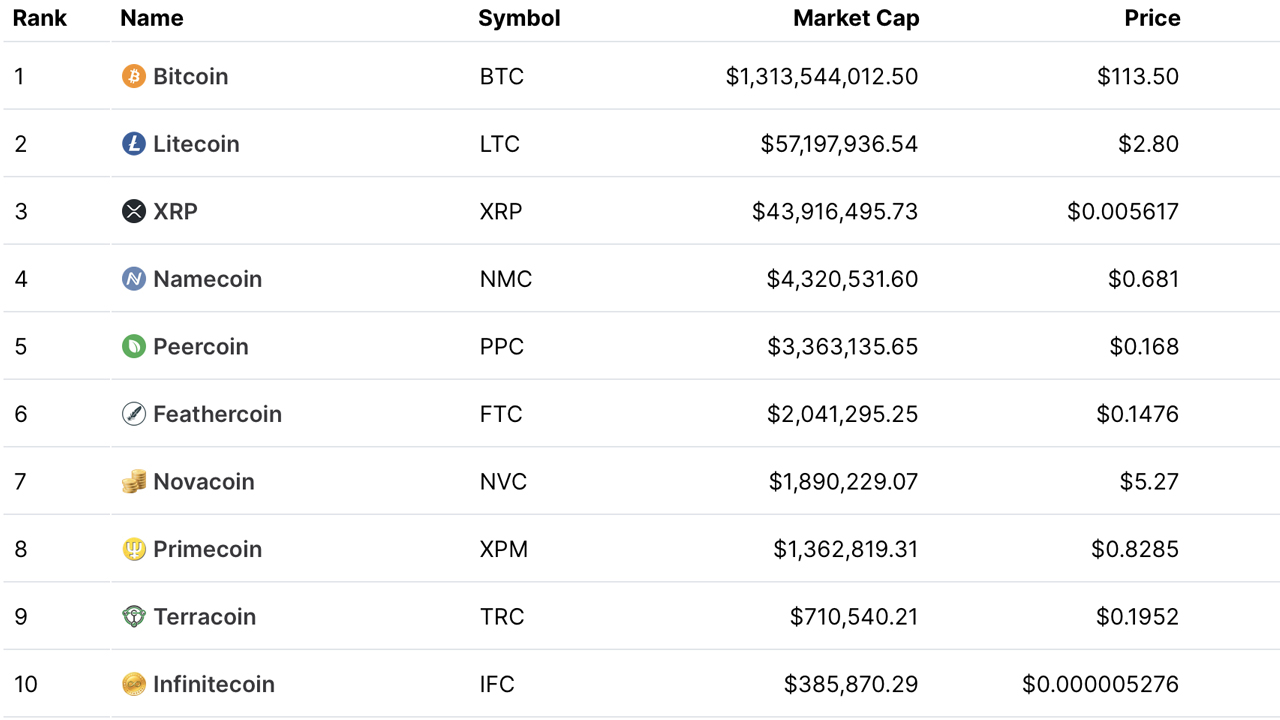The crypto community is patiently waiting for the highly anticipated Ethereum network upgrade from proof-of-work (PoW) to proof-of-stake (PoS) as The Merge is expected to happen 27 days from now. After Ethereum transitions from PoW to PoS, only two crypto assets in the top ten market cap rankings will be PoW tokens, which is a stark contrast to the top ten nine years ago.
The PoS Age Begins: Proof-of-Work Crypto Assets Disappear From Top Ten Market Cap Standings
This year, for the first time in crypto history, three stablecoins entered the top ten largest market cap positions. During the first week of May, Terra’s stablecoin UST made it into the top ten alongside USDT and USDC, but after UST’s depegging incident, the token fell from the top ten coin rankings. After UST’s implosion, the Binance Smart Chain-issued BUSD stablecoin joined the top coins by valuation and today, three stablecoins remain in the top ten.
That wasn’t the case nine years ago, on August 18, 2013, as there were no stablecoins in the top ten, because the stablecoin trend was not prevalent at all back then. In 27 days, Ethereum will change from PoW to PoS after operating as a PoW chain for seven years, and when that happens, only two coins in the top ten will be PoW tokens. The last standing top two PoW crypto tokens in the top ten will be bitcoin (BTC) and dogecoin (DOGE). This trend was also not prevalent nine years ago in 2013, when the top ten crypto tokens were mostly PoW coins.
On August 18, 2013, bitcoin (BTC) was changing hands for $113 per unit and ethereum was nonexistent. In fact, the Ethereum blockchain did not launch for another 711 days after August 18, 2013, and litecoin (LTC) was the second-largest crypto token by market cap. Proof-of-stake crypto assets were conceptualized at the time, and in 2013 there were a number of hybrid proof-of-work and proof-of-stake tokens with peercoin (PPC) leading the charge. PPC was the first hybrid PoW/PoS blockchain introduced to the crypto community, and it was created by the pseudonymous developer Sunny King.

Nine years ago, the PoW and hybrid PoW coins in the top ten included bitcoin (BTC), litecoin (LTC), namecoin (NMC), peercoin (PPC), feathercoin (FTC), novacoin (NVC), primecoin (XPM), terracoin (TRC), and infinitecoin (IFC). At that time in 2013, the only non-PoW coin in the top ten standings was XRP, and XRP is still in the top ten crypto market cap rankings in 2022. Close to seven years ago on August 23, 2015, there were fewer PoW coins in the top ten, even with ethereum (ETH) joining the ranks as a PoW coin.
At that time, only six PoW coins existed in the top ten, including BTC, LTC, ETH, DASH, DOGE, and BCN. At the time in 2015, hybrid PoW/PoS coins were pushed down in value and pure PoS networks started to become more prevalent. On August 23, 2015, banx shares (BANX) and bitshares (BTS) were among the most valuable PoS assets. BTS still exists and is worth $0.010 per unit today while BANX is non-existent following significant controversy.
Doge Holds Top Ten Position by a Thread
Two years later, six PoW coins still remained in the top ten on August 20, 2017. PoW coins included at that time were BTC, ETH, BCH, LTC, DASH, and ETC. BCH, LTC, DASH, and ETC no longer appear in the top ten standings. Further, a few other coins that once held positions in the top ten like IOTA, NEM, and NEO have also dropped out of the top ten standings since then. That was close to five years ago and today, DOGE and BTC are the last PoW coins standing in the top ten.

Moreover, it’s worth noting that dogecoin (DOGE) is in the tenth position and is fairly close to polkadot’s (DOT) market cap in size. When The Merge takes place and Ethereum becomes a PoS chain, there’s a chance DOGE may not be in the top ten if prices change. If DOGE is knocked out and The Merge is complete, BTC will be the only proof-of-work digital asset out of the top ten largest crypto market capitalizations.
What do you think about the top ten coins losing proof-of-work dominance over the last nine years? Let us know what you think about this subject in the comments section below.
Image Credits: Shutterstock, Pixabay, Wiki Commons
Disclaimer: This article is for informational purposes only. It is not a direct offer or solicitation of an offer to buy or sell, or a recommendation or endorsement of any products, services, or companies. Cryptox.trade does not provide investment, tax, legal, or accounting advice. Neither the company nor the author is responsible, directly or indirectly, for any damage or loss caused or alleged to be caused by or in connection with the use of or reliance on any content, goods or services mentioned in this article.




